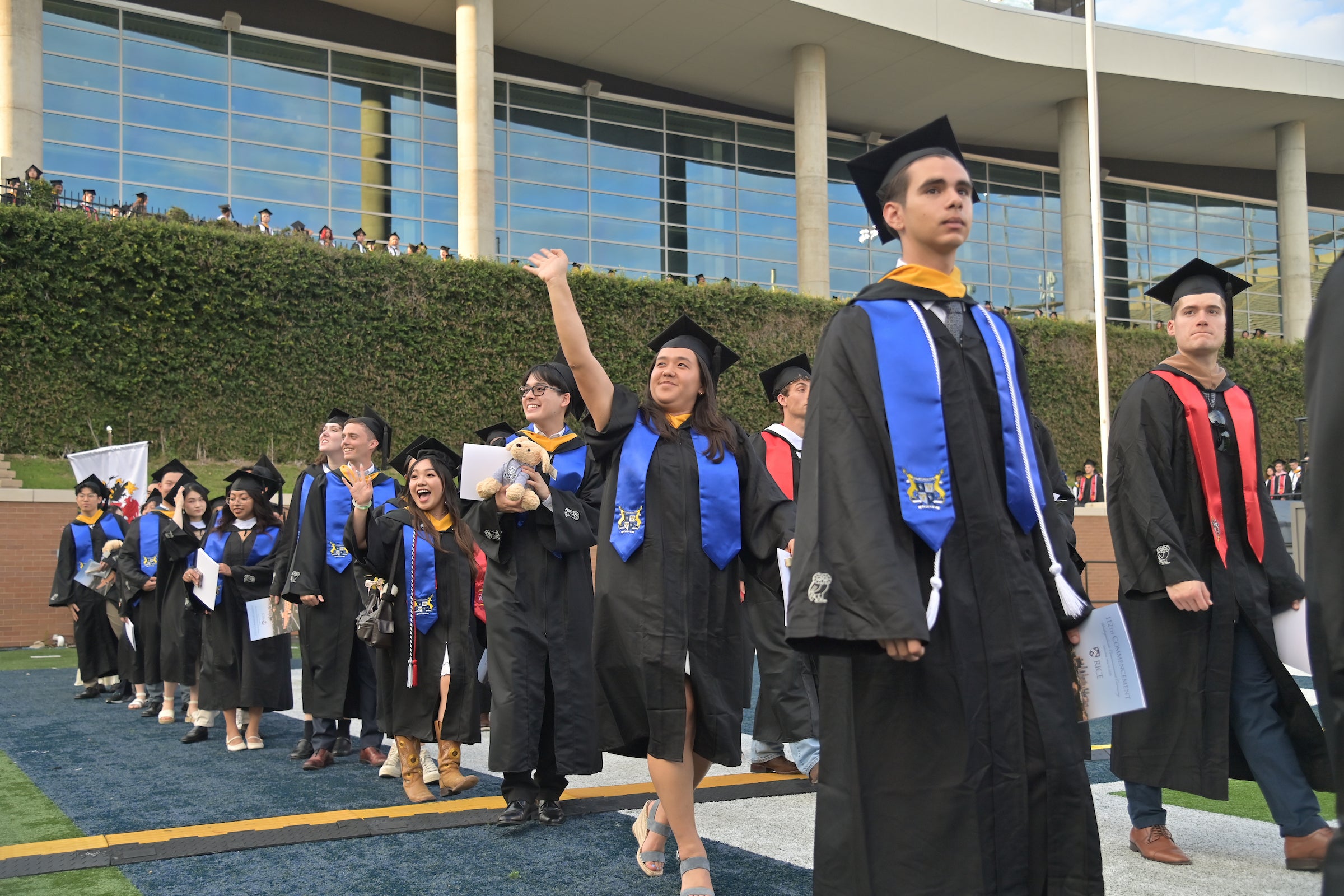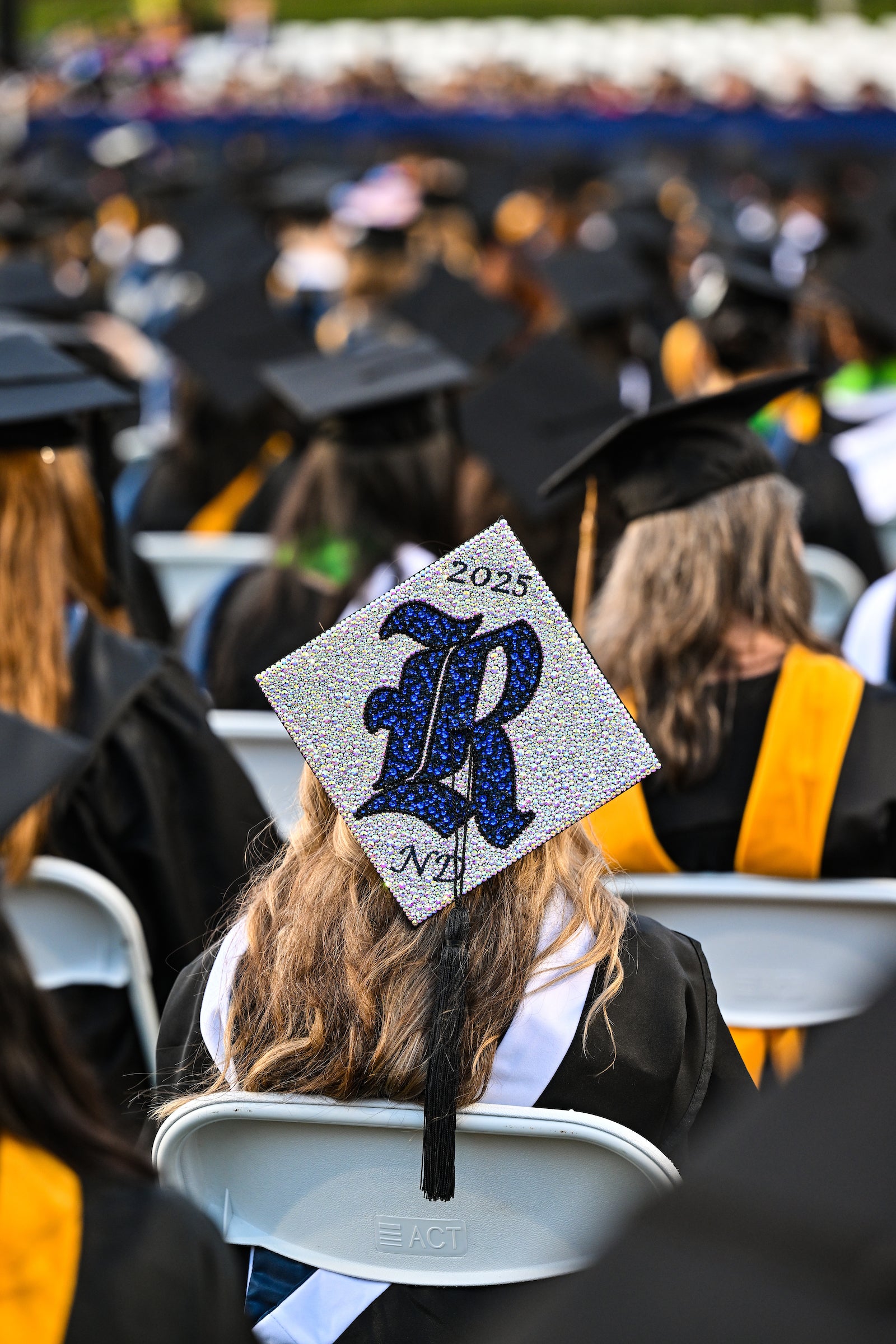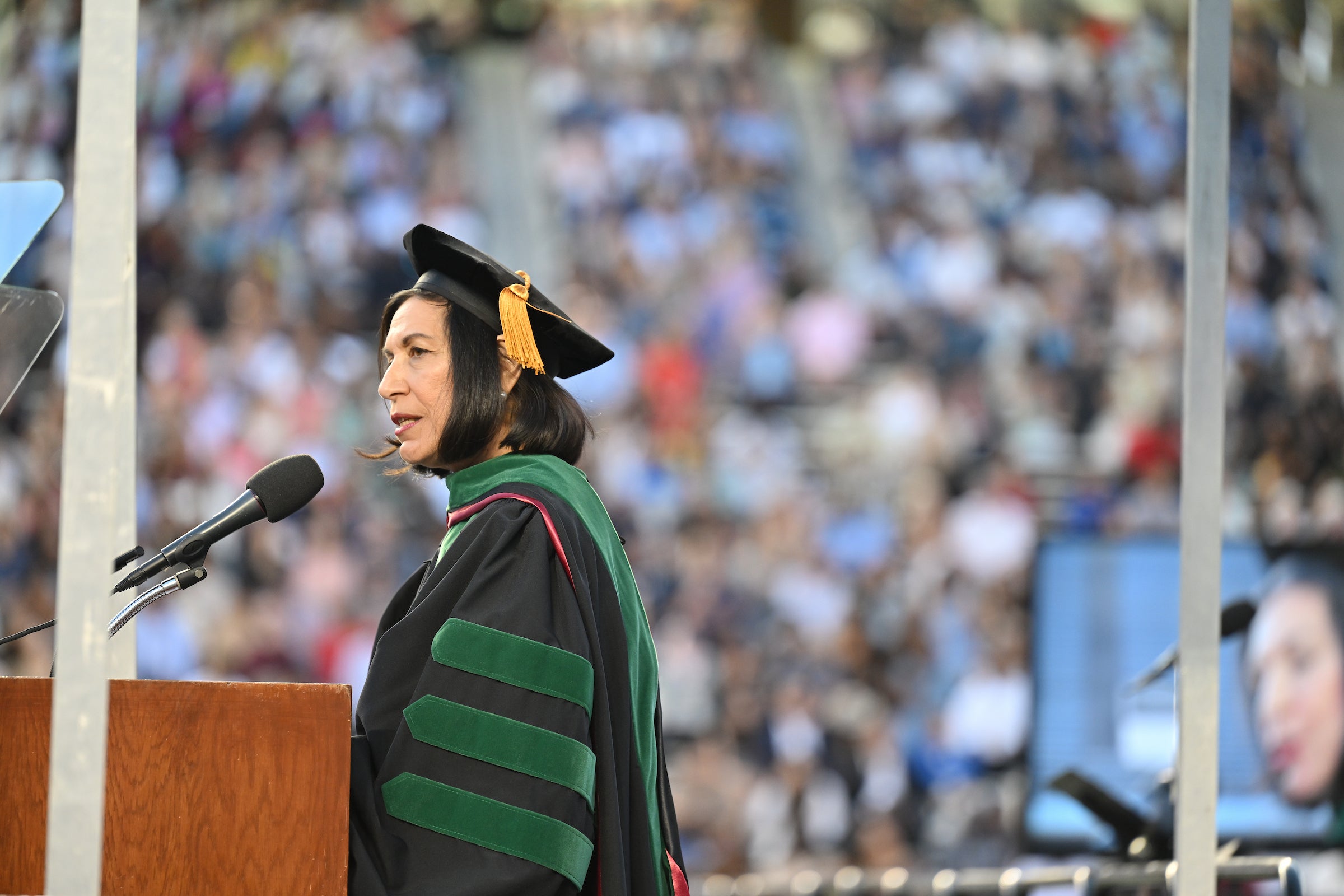
Good evening, and welcome to Rice University’s 112th Commencement.
I’m Reginald DesRoches, president of Rice University — though many of you in cap and gown know me simply as Reggie.
Giving thanks
Let’s begin by recognizing the many people whose love, wisdom and hard work helped get you here.
To our extraordinary faculty and staff — thank you for your mentorship, your passion and your unwavering commitment to our students.
To the families, friends and supporters who stood beside our graduates — cheering them on through late-night studying, setbacks and personal growth — your support made all the difference.
Graduates, if you’re able, please rise and join me in thanking the people who helped you reach this moment.
Embracing uncertainty with confidence and building resilience
This evening, I’m going to talk to you about uncertainty, a prevailing mood for many these days, and how embracing uncertainty helps to build resilience.
Uncertainty. It’s in our headlines, our workplaces, our daily lives and it’s in higher education like never before, it seems.
You have been at Rice during a time of uncertainty and transition. You arrived in the middle of a world-wide pandemic that upended higher education. You experienced new leadership for the university; you have endured new ways of teaching and learning born out of the pandemic and the emergence of artificial intelligence; and you have navigated a campus that has changed dramatically over the past four years with numerous new buildings and renovations.
And now, you graduate at a moment that is filled with change, flux and complexity. The world you’re stepping into feels fast-moving and unpredictable — socially, politically, economically and technologically.
But here’s what I want you to know, Rice graduates: you are more ready than you realize. The uncertainties you faced at Rice didn’t break you — they shaped you into more adaptable, more resilient and more resourceful individuals. This is more important than anything you learned in the classroom.
In fact, you — the Class of 2025 — are more prepared than any generation before you to not just survive uncertainty and change — but to lead through it.
Why? Because you’ve already done it. You’ve lived through disruption. You’ve studied — you may have had a few setbacks — but you have grown, flourished and adapted with grace. And you’ve emerged stronger, smarter and more resilient. Think about who you were when you walked through the Sallyport four years ago ... and who you are now.

What you’ve learned
The lessons you’ve learned at Rice go far beyond the classroom.
You’ve had the chance to live and learn among people from all walks of life, gaining exposure to new perspectives and deepening your understanding of the world, and yourself.
You’ve learned to collaborate, to listen, to rethink assumptions. You’ve learned how to disagree — respectfully but with conviction. You’ve learned the value of showing up — even when it’s hard.
And perhaps most importantly, you’ve learned how to keep going — especially when the future isn’t clear.
Moving forward
As a structural earthquake engineer, I have spent my career designing structures to withstand the forces of natural hazards, such as earthquakes and hurricanes. Designing structures to be “resilient.”
There are parallels between building resilience into structures and the resilience you will need to lead.
When we design structures for earthquakes, it is not about avoiding damage. It is about controlling the damage in a way where you can quickly repair and recover.
Similarly, the type of resilience you need isn’t about avoiding failure, it’s about developing the capacity to learn from, quickly recover and grow through the challenges that will come your way.
1. The importance of flexibility. In earthquake engineering, it is not the strongest structures that withstand earthquakes, it is those that are flexible and adaptable. Cultivate the flexibility in thinking; be open-minded and adaptable.
2. Redundancy is important. We design structures so that if one section fails, there is another load path that can carry the load without the entire structure collapsing. Similarly, build diverse networks. Continue to surround yourself with people from different backgrounds and perspectives. Different perspectives provide alternative solutions “alternate pathways” when your usual approaches don’t work.
As you leave Rice for your next chapters, remember this: uncertainty is not the enemy. Uncertainty leads to opportunity. It’s the space where growth happens. It’s where leadership begins — for yourself and others. It is where character is developed.
Keep doing the things that are hard. Take risks. Stay grounded in your values, but open to new ideas. And never lose your belief in the difference one person — one Owl — can make.
Resolute to Rice’s mission
As I look into the audience tonight, it is obvious that the world needs more Rice minds. That’s why — especially in these uncertain times — we remain resolute in our mission of “groundbreaking research and unsurpassed education” in pursuit of the discovery, improvement and dissemination of knowledge.
Fulfilling that mission requires an unwavering commitment to academic freedom — a core value of the Rice community and an essential condition for any university to explore, teach and engage with the world effectively.
We also continue to uphold our values of excellence and diversity. Our programs seek individuals with a rich variety of interests, talents, leadership abilities and life experiences — which may arise from, but are not limited to, differences in race, gender, ideology, politics, ability, geography or special talents.
And, we continue to cultivate a campus where every student, every faculty member, every staff member and every visitor — regardless of background, beliefs or identity — feels safe, respected and supported.
Despite the challenges and headwinds and what you may hear about higher education, I firmly believe that our universities and in particular, OUR UNIVERSITY — RICE — has never been stronger. All of our graduates — YOU — are better prepared than any before you to face the uncertainty and the exciting opportunities ahead.
I remain inspired by your resilience, your accomplishments, your talents, and your capacity to lead with heart and passion.
We can’t wait to see what you’ll do next. And wherever life takes you, remember — you are never alone.
You now join more than 66,000 Rice alumni around the world who share your spirit, your curiosity and your pride in this community.
We look forward to welcoming you back — many times in the years to come.
To the one-and-only Class of 2025 — congratulations! May your future be filled with purpose and the courage to face whatever lies ahead.

Introduction of commencement speaker Dr. Huda Zoghbi
It is now my pleasure to introduce our commencement speaker, internationally renowned neurogeneticist Dr. Huda Zoghbi.
Huda is a friend and colleague to many of us at Rice — both through her work as a researcher and Rice trustee emerita. I got to know and admire her during her service on the Rice Board of Trustees, where she was a champion for advancing knowledge and mentoring future generations.
Her pioneering research has transformed our understanding of brain development and neurodegenerative diseases. She is the founding director of the Jan and Dan Duncan Neurological Research Institute at Texas Children’s Hospital, a Howard Hughes Medical Institute investigator and a Distinguished Service Professor at Baylor College of Medicine.
Huda is best known for her groundbreaking discovery of the genetic basis of Rett syndrome, a severe neurological disorder affecting young girls, as well as her research into the genetic roots of adult-onset neurodegenerative diseases such as spinocerebellar ataxia and Alzheimer’s. Her work has not only advanced the scientific field but has offered hope to countless families around the world.
Among her many accolades, Huda is a recipient of the Breakthrough Prize in Life Sciences, the Kavli Prize in Neuroscience, and the Shaw Prize in Life Science and Medicine. She is a member of the National Academy of Sciences, the National Academy of Medicine, and the American Academy of Arts and Sciences, among others.
Undoubtedly, Huda’s contributions to neuroscience serve as a powerful example of how scientific discovery can transform lives. At this moment in history, when the world is increasingly shaped by advancements in research and technology, her insights could not be more timely or relevant.
Born and raised in Lebanon, Huda received her undergraduate degree in biology from the American University of Beirut and began medical school there in 1975. The civil war in Lebanon broke out during her first year of studies. After she spent a semester living in the basement of the university to stay safe, Huda moved to the United States, where she transferred to Nashville’s Meharry Medical College.
Huda completed a pediatric residency as well as a residency in pediatric neurology at Baylor College of Medicine and Texas Children’s Hospital in 1985. Seeing children with incurable, inherited neurological diseases and not being able to provide them with hope piqued her interest in research and led her to pursue a postdoctoral fellowship in molecular genetics under the mentorship of the preeminent geneticist Dr. Arthur Beaudet. She joined Baylor College of Medicine’s faculty as an assistant professor in 1988.
Huda, we are so honored that you are here and can’t wait to hear more about your inspiring story. The podium is yours.
To watch Zoghbi’s speech, visit: https://commencement.rice.edu/
Office of President
Campus Location
Allen Center, Suite 440
6100 Main Street
Houston, TX 77005
Mailing Address
Office of the President–MS 1
Rice University
P.O. Box 1892
Houston, TX 77251-1892
Contact Information
713-348-4500
president@rice.edu
